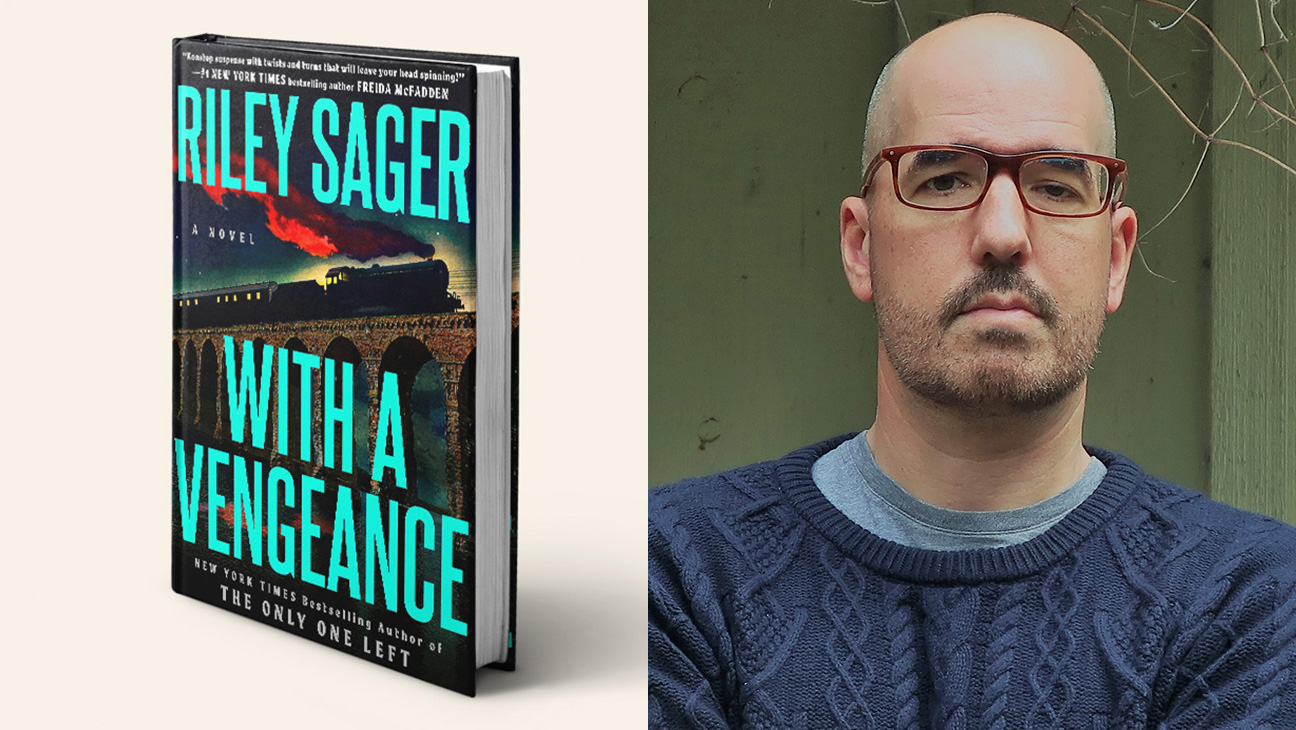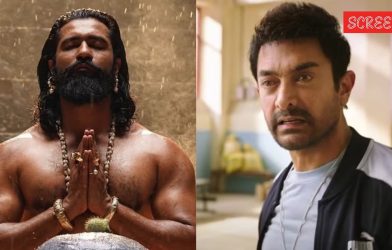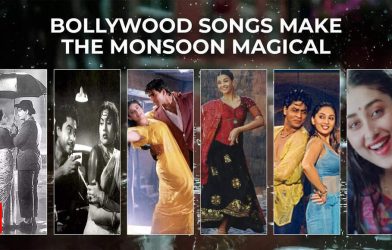Out of his nine published books under his pen name Riley Sager, all have hit the New York Times bestseller list. Since his breakout hit Final Girls in 2017, the author has become known for his thrilling suspenseful stories that offer a dash of horror elements. His novels have been published in over 35 countries, with more than 3 million copies sold worldwide. But in a world of adaptations, a lingering question follows Sager’s success: Why haven’t any of his books been adapted yet?
“Just make movies out of my books Hollywood! It’s weird because I love movies, I love TV, and I’ve come close. It’s so nice to be courted by Hollywood but now I’ve run a little bit cynical, where I’m just like, ‘Yeah, this is probably not gonna get made either,’” Sager tells The Hollywood Reporter.
“I would like to see just one. And I know that it takes a while. I think about Harlan Coben. He was writing for like 20 years, and the only thing adapted was a French version of Tell No One, and now he’s like the king of Netflix limited series,” he adds.
Two of Sager’s novels, Final Girls and The House Across the Lake, are reportedly in the works. Paul Feig and Netflix have boarded a film adaptation of House Across the Lake with Universal acquiring the rights to Final Girls. Sager also teased that Only One Left is possibly being adapted into a limited series. But until then, Sager has put his focus on offering stories for readers with a new one ready to pay homage to the Agatha Christie classics And Then There Were None and Murder on the Orient Express.
With a Vengeance, publishing June 10, is the next installment in Sager’s literary suspenseful universe and takes readers to 1954. The story centers on protagonist Anna Matheson who has been waiting 12 years to take vengeance against the six people who destroyed her family. Under false pretenses, Anna lures the culprits aboard the train her father loved and lost. The catch? They are the only passengers. Despite Anna’s meticulous preparations, her intent to force confessions from the passengers and deliver them directly to authorities is immediately derailed when just hours into the trip one of her guests is murdered.
“As the train barrels through the night, it becomes clear that someone else on board is enacting their own form of revenge—and that they won’t stop until everyone is dead,” publisher Dutton teases.
“When you think books on trains, you think Agatha Christie’s Murder on the Orient Express. I also love Agatha Christie’s And Then There Were None. So what if I combined the two?” Sager recalls when brainstorming the novel.
Ahead of the book’s release, Sager chats with THR about With a Vengeance, which iconic film he once wrote a sequel for, gives an update on those reported adaptations and why he’s trying to get Florence Pugh a copy of his new book.
***
Was there always an idea floating around to do something on a train setting and/or an Agatha Christie homage or what led to this story and it being the right time for it?
This is a strange book in that it has so many weirdly contradictory influences. On the one hand, I got the idea in summer of 2023 when there were so many great train scenes in movies: Bullet Train, Indiana Jones: The Dial of Destiny, the utterly amazing climax of Mission Impossible: Dead Reckoning Part One. I loved all of those scenes. I wanted to write a book on a train, because that seems like it would be fun.
When you think books on trains, you think Agatha Christie’s Murder on the Orient Express. I also love Agatha Christie’s And Then There Were None. So what if I combined the two? This is where things get very weird. It is set in 1954 because that is when White Christmas was released, and I love the movie. And there’s the scene where they hop on the train and the conductor tells them the whole train is full. But you do not see anyone on that train except the four of them and the conductor. And that got me thinking about ‘50s, empty train, overnight journey, murder, like, what’s going to happen? And then that’s when this TV show Revenge came into my head. And so all of these things combined to make me think, OK, woman getting vengeance on an overnight train trip in the 1950s let’s do this.
You had teased that this book was very different from anything you’ve done before. Do you feel that was because of the story itself and the time period or were there writing challenges with this story in particular?
It was definitely because of the time period. This takes place entirely in a time period where most of my readers, and me, were not alive. It’s almost a real-time book. I think the train trip is 13 hours, and it takes less to read that, but it is kind of this hour by hour, real time experience. It’s a very confined space with very few characters. It’s practically a locked room mystery, and there’s nowhere for the characters to run. But that also made it difficult to write, because there’s nowhere for the characters to go chill when they’re not part of the action. And so it was a logistical challenge to arrange these people back and forth on this straight line of a train. How do you build suspense that way? How do you do red herrings and keep some people hidden and make some people suspects? I ended up just envisioning the train like a Clue board, and the each of the characters was just a little piece being moved around in each different car at different moments. I had to keep track of all of them, all at once the whole time.
At one point in the story, the character Anna says one of the reasons they’re on the train is because she was inspired by all the films she’d seen that were set on one including Strangers on a Train, The Narrow Margin and The Lady Vanishes. Then she says that because she’s in a real-life murder mystery she has to think and act like the characters in those movies. So when conceptualizing this story, did you use those films as a springboard and write like you were watching one of those films or was it just to have a fun acknowledgement of the story similarities?
I love movies, and they definitely inspire my writing. And in the case of the Philadelphia Phoenix, the train in the book, I did think of it not as a real train, but a movie train. I did a whole bunch of research on trains of the time period and how they worked, and I quickly realized the plot does not fit the reality in that time. (Laughs.) And on movie trains, things can happen that would never happen in real life. It was fun to think of it that way, where I could get a little crazy with things like [being] on top of the train and this empty luggage car and the observation car and all of that kind of fun stuff. I know that there are lots of train people out there who are very knowledgeable about the trains. I do think some of them will probably read this book and think, “What is he talking about? This is how any of this works!” I’m trying to put it out into the world that I know that this is not how it works!
In your stories, you lean into atmospheric settings whether it be a suburban cul-de-sac, a haunted house or, now, a train, which are very much settings that a lot of other thrillers or horror novels have taken place. Yet you’re always able to give such a fresh take and twist on them. How do you go about taking a familiarity with a setting and make it something new?
For me, the the familiarity is a helpful tool, because everyone comes in with a certain set of expectations. They’ve seen a train movie; they’ve read a train book. They know what takes place in these books. And so it’s my job to then come up with ways to lean into it and then also subvert it. That was something that was very fun to do in planning the book: How far do I want to take this? Because there’s things you expect, like someone pulling that emergency brake or someone being on the roof. It was just a matter of, OK, let’s do this but add a little twist to it, and they expect this, then let’s make it this way. I enjoy working with these familiar locations and themes, because you do get to play around with it and deconstruct it a bit and then rebuild it.
You’re also known for your twists. How do you still maintain some kind of level of ambiguity to readers and keep them guessing what is really going on?
It gets more difficult with every book. I know that I have this reputation now, and there is the expectation for the twist. And then making things more difficult is that there are so many great writers working right now at the top of their game, coming up with some bonkers, amazing twist. And so you have to keep up with that. What I try to do is very early on in the writing process, I know the ending, and then I come up with the twist. That’s [usually] enough for most authors. It’s not enough for me and my readers. So then I try to come up with something else. It’s the big twist that everyone is sort of expecting, and then there is another twist or two or three on top of that. And so it it does get very difficult, and sometimes I have to change course. In the case of With a Vengeance, the ending and the culprit that’s there now was not the culprit in the first draft. I was discovering in the revising process, who could be better person to have done these things? Sometimes really not figuring out ’til very late in the game, despite my best efforts to know from the start.
Given you come with a new book ever year, at this point do you have an index of ideas of things you would like to touch on in future books or is it more just what comes to you in the moment?
I do have a mental stockpile. Sometimes I’ll just get an idea and they come at the weirdest time. Like, for instance, I just got a great one this week while scrolling through Instagram, and I can’t say anything else, but there was this Instagram post, and I’m like, “That’s fascinating. It would make a very interesting book!” So I emailed myself just one sentence and just say “book idea,” and then it’s in my inbox if I ever need it. But usually if it’s a really good idea, it just stays in my brain and I don’t need to write it down. I feel that the ones that you forget weren’t worth it in the first place. The ones that stay with me are the ones that I want to explore.
Any ideas that you still love but just know you aren’t going to write?
Oh, yeah, it’s so embarrassing. It was honestly too late, but when I realized the 50th anniversary of the release of Jaws the book was approaching, I had an incredible idea for a book sequel to Jaws. I wrote a one-page synopsis that I was about to send to my editor and be like, “This is my next book. Can we get the rights?” It would have been a disaster.
Because you feel like the love for the film and book would’ve resulted in too much criticism or just the story wouldn’t work?
There just wasn’t enough time to get it done and who knows if I would have been able to get approval from the Peter Benchley estate. But I wanted to do a sequel to Jaws, but it takes place in Amity, and it’s a year after the event of Jaws. There’s a film crew filming a movie based on the events that happen with the shark and Amity. And so it was going to be very meta. There was going to be a fake shark and a real shark. It would have been just bonkers and not a good way. So I wisely said, this is not going to work. Just put it in your dream file.
You began publishing under a pen name in 2017 and you had said that it was a matter of necessity because you wouldn’t be published now if you were still using your real name. Do you still think that would’ve been the case now? Especially when other factors can play a big role when it comes to book popularity whether it be social media and influencers, podcasts or being celeb book club picks.
The industry was weird back then, and it continues to be weird, and there are so many factors beyond your control. One of the toughest parts of being an author is just knowing that a lot of your success rests on outside factors that you cannot control at all. I really was at the end of my career when I decided to write Final Girls. I didn’t have a good publishing experience. I worked hard [but] the sales weren’t there. I was dropped by my publisher. I was laid off by my newspaper job, so I was just in a really dark, bad place, and I just thought of this idea for Final Girls. I wrote a one-page outline and sent it to my agent, and she said, “I love this idea. Just do it, write!” And I did very quickly, and she read it and said, “This is by far the best thing you’ve ever sent me. This could be a very big book. You need to use a pen name.” And I said, “But why? I wanted to put my name on this. I’m proud of this book.” And she laid it out in very stark terms. She’s like “You can put your name on this book. The publishing industry being what it is, every editor I send it to is going to look at your past sales, see that they’re abysmal, give you a really bad offer or no offer at all.” In publishing, you’re only as good as your past sales, unfortunately.
We were at this weird crossroads where if I wanted to succeed, I needed to kind of shed my name and take on a new one. And it’s interesting because we did it not to fool readers and not even really to fool editors, but just it was a way of telling editors to base all your decisions on the book and no other factor. And so they did. That was very valuable, because they knew nothing about me. They just had this book, and I found the perfect home in my publisher Dutton Books, and my amazing editor — I’m still with her today — because she was able to just focus on the book itself and none of the noise.
There have been reports of a couple of your books being optioned. Can you give any sort of update on where your books are in the adaptation process? The House Across the Lake reportedly had Netflix and Paul Feig on board, Universal had rights to Final Girls. ...
They’re in development. There are a lot of very good, smart people working on them, and that’s really all I know. I try not to get too involved in that whole thing, because I know where Hollywood is concerned things can change on a dime and for seemingly no reason. I prefer to just remove myself from all of that and just wish them well and hope for the best. And I always say, “If you have any questions, I’m here!” And no one ever like contacts me and that’s fine, because they’re the experts. Like, I’ve never made a movie before, so I trust the professionals to know what they’re doing and to try to shepherd some of these things to the big and the small screen.
So you would never want to write any of the adaptations?
The one that I feel like I could actually write a screenplay for and adapt is Lock Every Door. I think that Lock Every Door would make a great one-hour-and-45-minutes scary movie.
You see plenty of authors who have begun having their own cinematic or television universe with their books being adapted yet none of your stories have yet to come to screen just yet. Apart from Lock Every Door, are there any that you’re wondering why they haven’t been adapted or any that you also hope could be brought to life onscreen whether in a film or show?
That’s the one. I think it would be the easiest to adapt. That’s the one book I’m like, this wouldn’t be hard to film. It’s not many characters. It’s just an apartment building. It wouldn’t be that expensive to make. It’s a great twist, if I do say so myself. That’s the one where I just wonder, why hasn’t this been made yet? It would be really good. All the others I can think of reasons why it would be difficult to adapt because of the structure or certain plot points, but that one, I feel like it’s pretty straightforward. Come on, Hollywood!
Let’s campaign for it.
Yeah! Let’s do it for a Lock Every Door movie.
Speaking of The House Across the Lake, you candidly said that you knew that one would be polarizing, but it was still worth the risk because it was creatively fulfilling for you. How do you find that balance of writing something you know your readers will enjoy but still try to venture out and feel satisfied creatively for yourself? Do you feel pressure to keep building on that success?
That’s a very good question. It is a very difficult balance to make because I do keep my readers in mind. I know that they have expectations, and I know what they want from a Riley Sager book, and I want to give them that because they’ve been with me since Final Girls back in 2017 and I don’t ever want to disappoint them. But at the same time, I’m not going to give them the same thing every book. By this point, my longtime readers know that that they’re going to get a haunted house one year, we’re going to get a 1950s train the next, and then there’s going to be a bonkers twist on a lake. I like that relationship that I have with my readers, and I think that they like it as well, so I’m always keeping them in mind. But there are times when I don’t necessarily want to give you this twist, but I know that you want this twist, and so I will do that for you, readers, because I care. But usually I’m never going to write a book that I am not interested in and don’t want to do. I think that shows in the writing. I think sometimes you can tell when an author isn’t fully invested in the story where I’m just writing this because I need to get a book out this year. And so I try to avoid that at all times. It is a matter of maintaining my excitement.
When readers think of Riley Sager they maybe think of the horror genre, but you have said that you don’t think of yourself as a horror writer but rather a writer of psychological thrillers with a horror element. Do you envision always straddling both worlds, or what are the stories you want to continue to tell?
I definitely will continue on this track. I do think I write scary books for people who don’t like to be scared. In the past I’ve said I’m not horror, I’m horror-adjacent. I’m scary for people who don’t normally read scary stuff, I think. I didn’t tend to sort of fill that niche, but in hindsight, it’s a niche that I think needed filling, because there are a lot of people out there who want the thrills and the scares but not the horrible existential terror that some horror novels bring to the table. (Laughs.) And I’m the same way. I like scary movies to a point. I love Scream and Halloween. But Hereditary? Great movie but, my God, that messed me up. There will never be Hereditary vibes in any of my books where it’s just where you feel icky afterwards.
With a Vengeance is coming out, but I imagine there could already be another one in the works. Can you tease what’s next?
I’m in the middle of writing it. I don’t like to say too much about it, because I feel it’s like a balloon, and if you talk too much about it, it just lets the helium out, and then the whole thing just plops to the floor. I will say that it is set in Vermont and my readers will know that when I go to Vermont things get a little weird. It’ll be my third Vermont book, and my two previous Vermont books are my creepiest by far.
Anything else you’d like to mention?
Just make movies out of my books Hollywood! It’s weird because I love movies; I love TV, and I’ve come close. It’s so nice to be courted by Hollywood, but now I’ve run a little bit cynical, where I’m just like, “Yeah, this is probably not gonna get made either. We’ll see!” I would like to see just one. And I know that it takes a while, because I think about Harlan Coben. He was writing for like 20 years, and the only thing adapted was a French version of Tell No One, and now he’s like the king of Netflix limited series.
[For With a Vegeance] I was picturing Florence Pugh the whole time. I think they’re trying to get a copy to her, like my film agents at WME. I’m just like “Just try to get this somehow to Florence Pugh.” I know everyone wants her, and she’s fielding a gajillion offers, but give it to Florence Pugh please! She’d be a perfect Anna!
With a Vengeance is available now.









